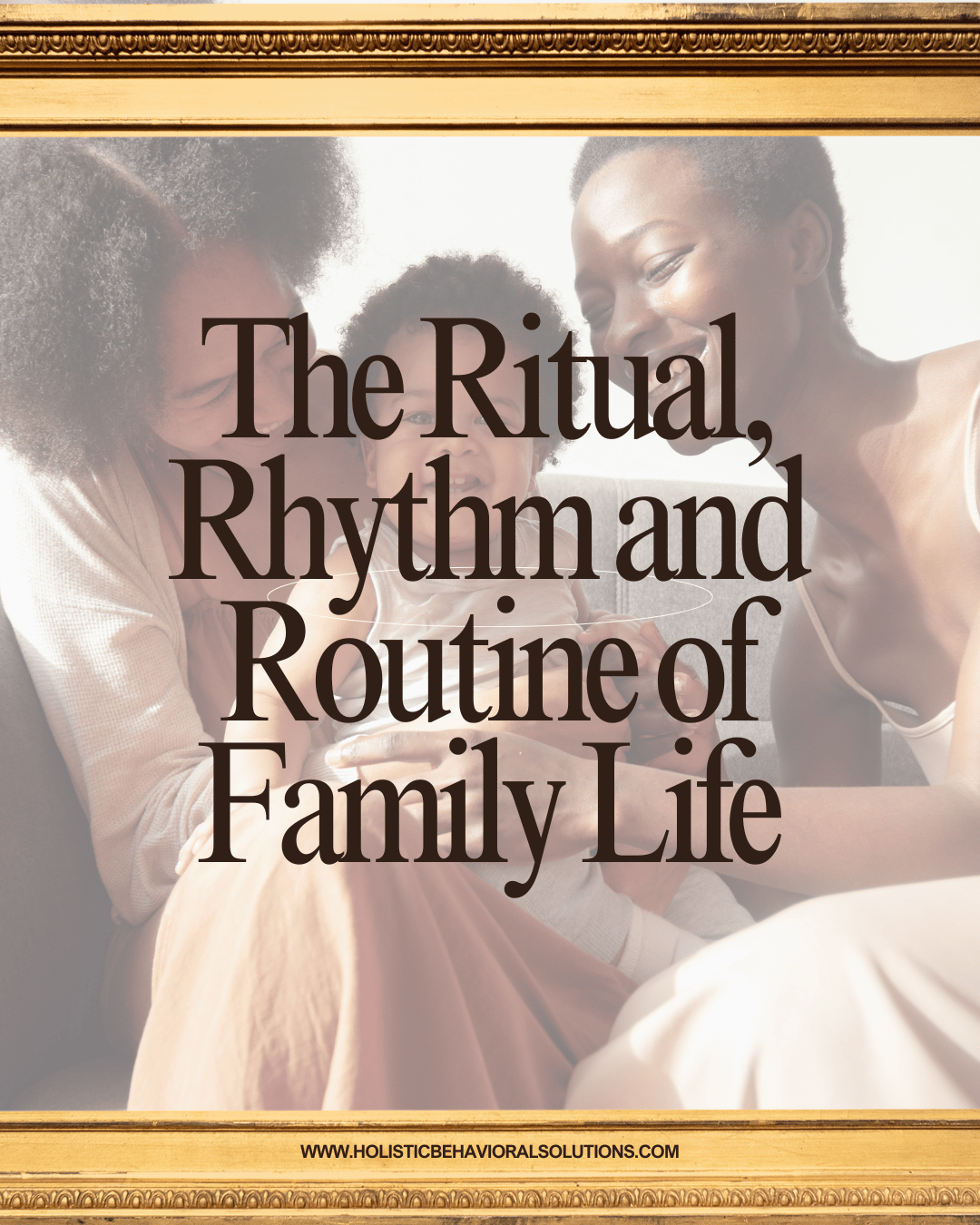
The Power of Ritual, Rhythm, and Routine in Family Life: A Mental Wellness Guide
Let’s be honest—life is nonstop. We’re juggling work, school, responsibilities, and relationships, often on little sleep and even less peace. In the midst of all this, families need more than just schedules—they need stability, predictability, and emotional connection.
That’s where rituals, rhythms, and routines come in. Together, they form the emotional backbone of family life, offering comfort, structure, and support. More than just habit—they are mental health tools.
What Are Rituals, Rhythms, and Routines?
- Rituals are meaningful, repeated moments—like Sunday dinners, bedtime stories, or Friday night walks.
- Rhythms are the flow of how a family moves through time—mornings, evenings, seasons, transitions.
- Routines are the practical steps we follow each day—brushing teeth, packing lunch, logging off screens.
When aligned, these elements provide emotional security and promote resilience, connection, and wellness.
🔸 Why Rituals Matter for Mental Health
Rituals are about more than habit. They build identity, tradition, and belonging—especially for children.
- Emotional Anchors: Rituals offer grounding in times of uncertainty or stress.
- Relationship Builders: Shared moments build connection, empathy, and emotional availability.
- Resilience Boosters: Children with consistent family rituals are more likely to feel safe, confident, and connected.
“The bedtime story isn’t about the book. It’s about the bonding.”
🔹 Family Rhythms: The Emotional Tempo of Daily Life
Rhythms shape how the family operates day-to-day. Are mornings chaotic? Are evenings quiet? The rhythm of your home influences everyone’s stress levels and mood.
- Predictability Lowers Anxiety: When kids know what’s coming next, their nervous systems relax.
- Flexibility Builds Resilience: A rhythm doesn’t mean rigidity—it allows for flow, but with a pulse.
- Collective Regulation: Families that move in sync tend to regulate each other emotionally.
🔸 Routines as the Foundation for Stability
Routines give families something to stand on—especially during tough times. They reduce decision fatigue, support executive functioning, and help all members feel more in control.
- Children Thrive on Structure: Daily routines support attention, learning, and emotional regulation.
- Adults Benefit Too: Routines help parents manage their many roles with less burnout.
- Healthy Habits Start Here: Whether it’s sleep, nutrition, or screen time—routine makes consistency possible.
How to Strengthen Ritual, Rhythm, and Routine at Home
- Start Small and Stay Consistent
Choose one ritual to protect—like family breakfast or Sunday check-ins. Keep it simple and regular. - Make It Meaningful
Even mundane tasks (like cleaning up) can become rituals when paired with music, shared effort, or a reward. - Get Everyone Involved
Children, teens, and adults should all have a voice in shaping your family rhythm. This builds buy-in and belonging. - Be Flexible, Not Rigid
Stability doesn’t mean perfection. Life changes—adapt your rhythm to match the season you’re in.
Final Thought: Rituals Are Resilience
In a world that feels unpredictable, rituals, rhythms, and routines create emotional safety. They offer children the security of “what comes next” and give adults the structure to carry the load with more grace.
They’re not just about time management—they’re about mental health, identity, and connection. Invest in them. Protect them. They pay dividends for generations.
Family Wellness and The Holistic Store
While you build rhythm at home, don’t forget to care for your internal balance too. At The Holistic Store, we offer supplements and wellness tools that support focus, sleep, energy, and calm—for the whole family.
Visit our store and explore products that make it easier to show up with presence, patience, and peace.
PS: Are you a culturally competent licensed clinician passionate about guiding others toward resilience? Our practice is growing, and we’re hiring in New Jersey! Check out our Careers page for current openings and join a team dedicated to fostering impactful, inclusive mental health support.

